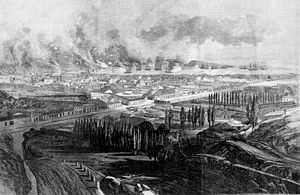Valparaiso bombardment
| Bombardment of Valparaíso | |||||||
|---|---|---|---|---|---|---|---|
| Part of Chincha Islands War | |||||||
 The Spanish fleet shelling the port of Valparaíso |
|||||||
|
|||||||
| Belligerents | |||||||
|
|
|
||||||
| Commanders and leaders | |||||||
|
|
N/A | ||||||
| Strength | |||||||
| 1 ironclad 5 frigates 1 corvette |
N/A | ||||||
| Casualties and losses | |||||||
| none | 2 killed 10 wounded 33 ships sunk |
||||||
The Bombardment of Valparaíso on 31 March 1866 happened after the Chincha Islands War, when a Spanish fleet shelled, burned and destroyed the undefended port of Valparaíso.
After the humiliating defeat at the Battle of Papudo and the indecisive Battle of Abtao, Rear Admiral Casto Méndez Núñez was ordered to take punitive action against South American ports. When the Chilean government ordered that vessels supplying or communicating with the Spanish fleet should not be allowed to enter Chilean ports, Méndez Núñez's first target became the most important and undefended Chilean city of Valparaíso.
Efforts to mediate were initially steered by European diplomats whose countrymen were most affected by the initial blockade of Chilean ports and by the threat of bombardment. High-level contacts took place intensively in late 1865 and early 1866 between London, Paris and Madrid. A formula to resolve the conflict appeared, at one stage, to have been secured.In the final two weeks, the United States was especially active. The American minister to Chile, General Hugh Judson Kilpatrick and the US Naval Commander John Rodgers who was at port commanding a US naval squadron composed of the ironclad monitor USS Monadnock and the steamers Powhatan, Tuscarora and Vanderbilt attempted a last-minute settlement with the Spanish Admiral. To that effect they enlisted the cooperation of the commander of the British Pacific Station, Rear Admiral Joseph Denman, who had under his command two warships: HMS Sutlej and HMS Leander. The British commander, despite coming under great pressure from British merchants in the city, later changed his mind and decided to enforce a strict neutrality, refusing the cooperation of his ships.
...
Wikipedia
